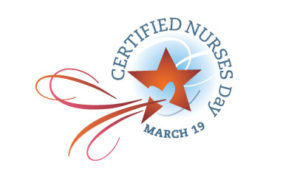 By Rose O. Sherman, EdD, RN, NEA-BC, FAAN
By Rose O. Sherman, EdD, RN, NEA-BC, FAAN
We recently celebrated Certified Nurses Day. I had the honor of speaking at a breakfast to honor nurses who achieved certification. I began by asking why they became certified. For most, it was what they professionally expected of themselves – to take their practice to the next level. What I didn’t hear was that they were forced to do it or did it specifically for career advancement. What they have learned about being certified is equally important. They feel more self-empowered, an evidence-based finding in the literature. They see themselves as being better able to mentor others. They also noted that because of the expectations for re-certification, they stayed current in their specialty areas in ways that other nurses did not. One nurse laughed and said, “you can’t ignore new evidence when you are certified because you constantly update yourself by taking classes”.
The research does tell us that patient outcomes improve when a high percentage of nurses working on a unit are certified. For organizations, having certified nurses means a stronger probability that evidence will be moved into practice more quickly. Nurses who are certified are far more likely to “own their practice” and to do the right thing because they expect it of themselves. They are also more engaged in their work because they have genuine interest in learning more about their specialty areas. This power over practice and having a strong purpose is also known to promote staff resiliency. Henry Thoreau once said that, ” what you get by achieving your goals is not as important as what you become by achieving your goals.
When asked why they don’t become certified, nurses cite the cost, time, lack of organizational incentives, no perceived value and a fear of failure. And yet we know in nursing as in life, we define what is important to us by how we spend our time and money. One of the most important things that leaders can do to improve their environments is to make them cultures of learning. Certification is an important part of this culture. For managers, my advice is that you make sure first and foremost that you are certified and then make it part of your culture. Don’t accept excuses for not seeking certification. Bring it up in every yearly evaluation session. There is too much at stake.
Read to Lead
American Association of Critical-Care Nurses [AACN]. (2015). Nurse certification benefits patients, employers and nurses. Retrieved from https://www.aacn.org/certification/value-of-certification-resource-center/nurse-certification-benefits-patients-employers-and-nurses
Bacglic, J.T. (2015). Life cycle of a nurse: Professional Certification. Available at https://www.rn.com/nursing-news/life-cycle-of-nurse-professional-nursing-certification/
Fitzpatrick, J.J. (2017). The Value of Nursing Certification: Revisited and Reinforced. Jorunal of Vascular Nursing. 22(3), 131-134.
© emergingrnleader.com 2018


 LinkedIn
LinkedIn Instagram
Instagram